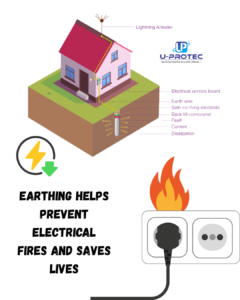How Earthing Helps Prevent Electrical Fires and Saves Lives

Introduction
Electrical fires pose a significant risk in homes, workplaces, and industrial settings. One of the most effective safeguards against these hazards is earthing, also known as grounding. Earthing provides a safe path for electrical faults, preventing dangerous situations that can lead to fires or electrocution. In this article, we’ll explain how earthing helps prevent electrical fires and saves lives, emphasizing why proper grounding is essential for electrical safety.
What Is Earthing?
Earthing connects electrical systems to the earth using grounding conductors and electrodes. This connection stabilizes voltage and offers a safe route for fault currents, preventing electrical buildup that could cause harm.
How Earthing Prevents Electrical Fires
- Safely Redirects Fault Currents
When wiring insulation fails or equipment malfunctions, excess current can flow through unintended paths. Earthing directs these fault currents safely into the ground, avoiding overheating of wires or components that might ignite fires.
- Prevents Electrical Arcing and Sparking
Without grounding, fault currents may cause sparks or arcs, which can ignite flammable materials nearby. Proper earthing reduces this risk by providing a controlled pathway for current flow.
- Enables Protective Devices to Function Properly
Earthing helps circuit breakers and fuses detect faults quickly by allowing fault current to flow. This triggers protective devices to cut off power promptly, minimizing fire hazards.
How Earthing Saves Lives
- Prevents Electric Shock: Grounding reduces the risk of people receiving dangerous shocks by diverting fault currents away from metal surfaces and appliances.
- Supports Safety Devices: Devices like RCDs (Residual Current Devices) rely on earthing to detect faults and disconnect power, protecting users.
- Enhances Safety in Wet Environments: Proper grounding is especially critical in damp conditions where shock risks are higher.
Importance of Proper Earthing Installation
Improper earthing can be ineffective or even hazardous. To ensure safety:
- Use appropriate grounding rods and materials.
- Maintain low earth resistance (generally below 1 ohm).
- Perform regular inspections and maintenance.
- Follow local and international electrical safety standards.
Conclusion
Earthing is a vital safety measure that prevents electrical fires and protects lives by safely managing fault currents and enabling protective systems. Whether in homes, businesses, or industrial sites, proper earthing is essential for electrical safety.
